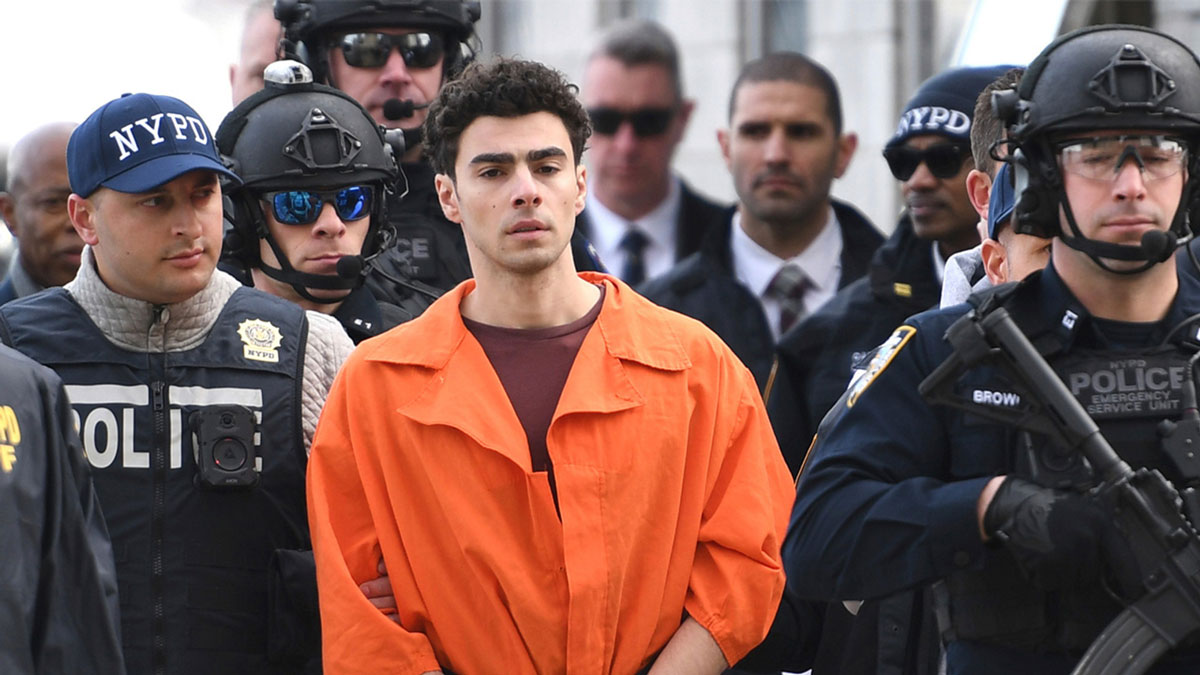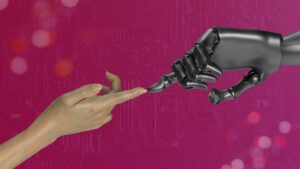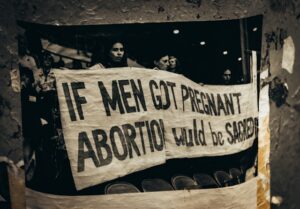Early on the morning of December 4th, UnitedHealthcare CEO Brian Thompson was fatally shot in Midtown, Manhattan ahead of an investor conference. Video surveillance shows a masked gunman approaching Thompson outside the Midtown Hilton entrance. The gunman shoots Thompson, fleeing the scene after the CEO falls to the sidewalk.
A search for clues found the bullets at the scene of the crime carried a message: “delay,” “deny,” and “depose.” Health insurance critics use these words when referring to tactics health insurance companies use to circumvent claims. Further investigation led officials to Central Park where a backpack believed to have belonged to the shooter was found stuffed with Monopoly money.
The manhunt for the gunman ended after a five-day search at a McDonald’s in Altoon, PA. An employee recognized the man eating at the restaurant from a “person of interest” photo released by the NYPD. After several dramatic days, a name and face could finally be put to the suspected shooter: Luigi Mangione.
Who is Luigi Mangione?
Luigi Mangione was born into a prominent family in Maryland’s Italian community. He was valedictorian of his prestigious private school graduating from an Ivy League university in 2020. For a time in 2022, Mangione lived in Hawaii in the co-living/co-working space Surfbreak.
In Hawaii, Mangione confided in friends about his struggles with chronic back pain, exacerbated after a surfing accident. Mangione left Hawaii to undergo spinal fusion surgery, a procedure aiming to relieve pressure on the vertebrae. He was not covered by UnitedHealthcare.
Mangione’s social media accounts spanned across platforms. His deleted Instagram, @luigi.from.fiji, displayed pictures from his travels and the fraternity he belonged to at the University of Pennsylvania. Mangione’s Reddit account, @Mister_Cacuts, showed he was active on a subReddit for spondylolisthesis, a condition where a vertebrae in the spine slips out of place. Mangione’s posts were often supportive: “the symptoms you’re describing suck, and are 100% real.”
He also kept track of several books about coping with chronic back pain on Goodreads. In January 2024, Mangione reviewed Ted Kaczynski’s, aka the Unabomber, 1995 manifesto on the site saying “It’s easy to quickly […] write this off […] But it’s simply impossible to ignore how prescient many of his predictions about modern society turned out.”
For some time before the murder, Mangione went dark, worrying his family and friends. His capture on Monday, December 9th is the first time many of Mangione’s loved ones have heard from him in months.
An unexpected response
Brian Thompson’s murder inspired a plethora of jokes and gleeful commentary across social media. One TikToker commented “I’m sorry, prior authorization is required for thoughts and prayers.” An Instagram user quipped “Does he have a history of shootings? Denied coverage.” UnitedHealthcare’s LinkedIn page had to turn off the comments and reactions on their post about Thompson’s passing as thousands of users were liking and applauding it.
Memes and jokes weren’t the only thing circulating the internet in the aftermath. Countless painful stories sharing experiences with the health insurance industry trended too. An X user posted that his mother’s stage IV lung cancer scan had been denied. Another shared that UnitedHealthcare denied a wheelchair to his son with cerebral palsy.
Notably, reactions to the shooting on social media seem to be coming from both sides of the political spectrum. In a New York Times article, Tim Weninger, computer science professor at Notre Dame and social media expert, remarks “People are legitimately actually pissed off at the healthcare industry, and there is some kind of support for vigilante justice […] It’s organic.”
The cost of healthcare in the United States is the highest in the world. However, the country is #48 in life expectancy and boasts high death rates for treatable causes. Mangione speaks to this in the short, handwritten manifesto found on his person at the time of his arrest. He adds, “[T]he reality is, these [indecipherable] have simply gotten too powerful, and they continue to abuse our country for immense profit.”
The legend of the American outlaw-hero
Henry David Thoreau, American naturalist and philosopher, wrote in 1849 “It is not desirable to cultivate respect for the law, so much as for the right.” The statement provides a reason to resist unjust laws and has, over time, produced a recurring character in folklore: the outlaw-hero.
America has a rich history of outlaws from the Depression Era’s John Dillinger to Breaking Bad’s Walter White. We crown the real Dillinger and the fictional White as champions for going against the established order of their times. Outlaw-heroes act to defeat evil, often operating outside the written rule of law. Because of this, some may see their actions as immoral. Others will hail the outlaw as a man of the people.
Outlaw-heroes are praised when their crimes continue to be directed towards the symbols oppressing the folk group. They then enjoy the continued admiration and help from those cheering them on for their daring do.
Americans owe $220B in medical debt. This was hardly discussed by either of the candidates in the 2024 general election. Mangione’s premeditated attack against Thompson transformed the narrative into one of heroes and villains: his actions exposed a giant corporation for the pain and suffering it’s caused hundreds of thousands. He gave people permission to express their anger towards increasing costs and coverage denials.
Insurance denials as violence
Usually, violence is associated with its physical manifestation. In America, guns are easy to purchase, and sell in the millions per year. In the first four months of 2024 alone, 5.5 million firearms were sold in the US. Death by shooting is commonplace with Americans being 25x more likely to die from a gun than in other high-income countries. Killing Brian Thompson on a Manhattan sidewalk is the type of violence Americans are routinely exposed to. However, because of Thompson’s position at UnitedHealthcare, the murder sparked conversation around a different kind of violence prolific in the US–administrative violence.
Medical debt and denied coverage leads many Americans to sacrifices they wouldn’t have otherwise considered, sometimes resulting in homelessness. Rep. Alexandria Ocasio-Cortez commented on the murder saying, “[F]or anyone who is confused or shocked or appalled, they need to understand that people interpret and feel and experience denied claims as an act of violence against them.”
UnitedHealthcare’s parent company UnitedHealthGroup is the largest private health insurer in the US currently at a $450B market cap. Private health insurers are not required to publish how often they deny claims. However, UnitedHealthcare denies an estimated third of submitted claims–more than any other insurer.
While the conversation around America’s failing healthcare system has been renewed, so has the conversation around violence. Certified Instagrammer @mattxiv’s summarizes, “People are murdered every day in the [US] – some by guns, many more by paperwork.”
Arraignment in NYC
Mangione’s arrival in Manhattan is deemed as the perp walk that launched a thousand memes. Meant for those holding power to shame the accused in front of the citizenry, this perp walk backfired.
It’s cinematic. Mangione is handcuffed, clad in prison orange, flanked by over a dozen people including NYC Mayor Eric Adams. Some compared the moment to Renaissance German painter Heinrich Hofmann’s depiction of the Arrest of Christ.
Mangione currently faces four federal charges including one punishable by death. He was brought to New York on December 16th for arraignment on state charges. In Manhattan’s Supreme Court on December 23rd, Mangione pled “not guilty” to all charges. His attorney, Karen Friedman Agnifilo, expressed concern over a fair trial, citing the highly publicized perp walk. She admonished Mayor Eric Adams’ involvement as robbing Mangione of his rights and tainting the jury pool.
There is concern of jury nullification. This occurs when a “not guilty” verdict is returned even when jurors believe beyond a reasonable doubt that the defendant has broken the law. Fordham School of Law associate professor Cheryl Bader says jury nullification is “a reaction by the jury to a legal result that they feel would be so unjust […] that they refuse to impose it, despite what the law says.” The allegations against Mangione are serious; the way to jury nullification is slim but not non-existent due to the overwhelming support he has.
In a letter to the court earlier this month, both parties requested more preparation time to bring the case to trial. They agreed to push the January 18th deadline to February 17th delaying the trial by several weeks. In the meantime, Mangione remains in custody at the Metropolitan Detention Center in Brooklyn.
Check out:












Be First to Comment